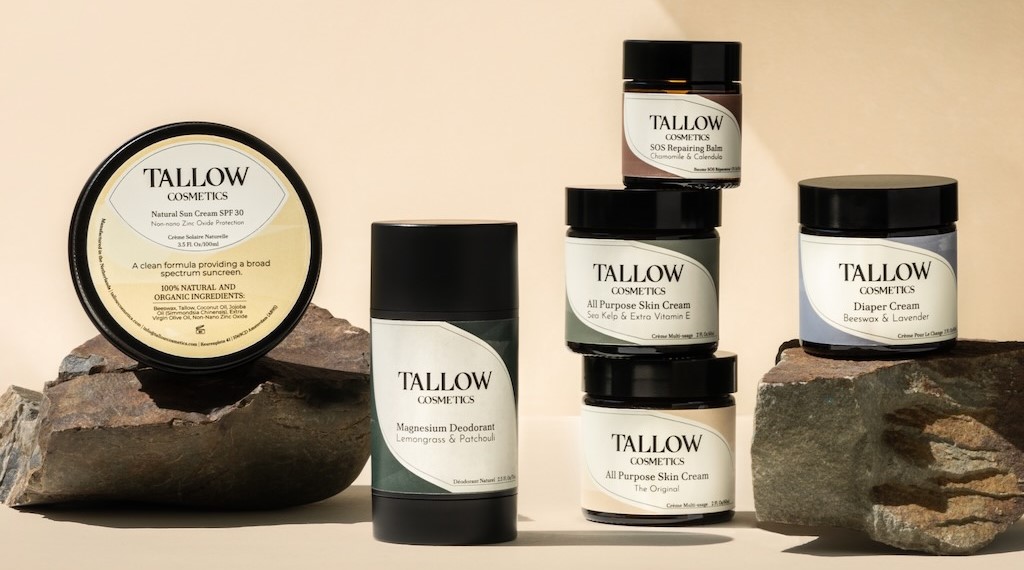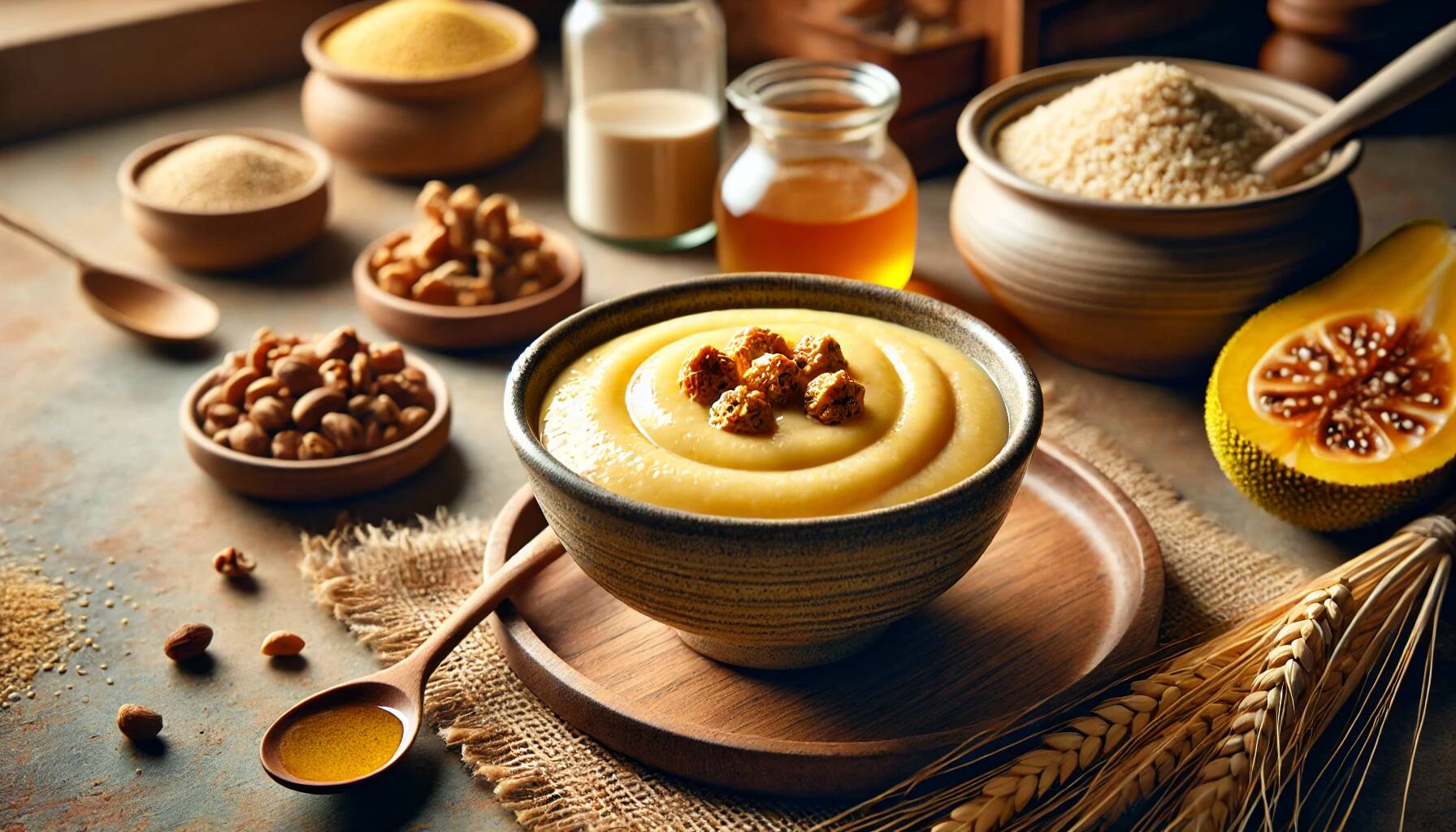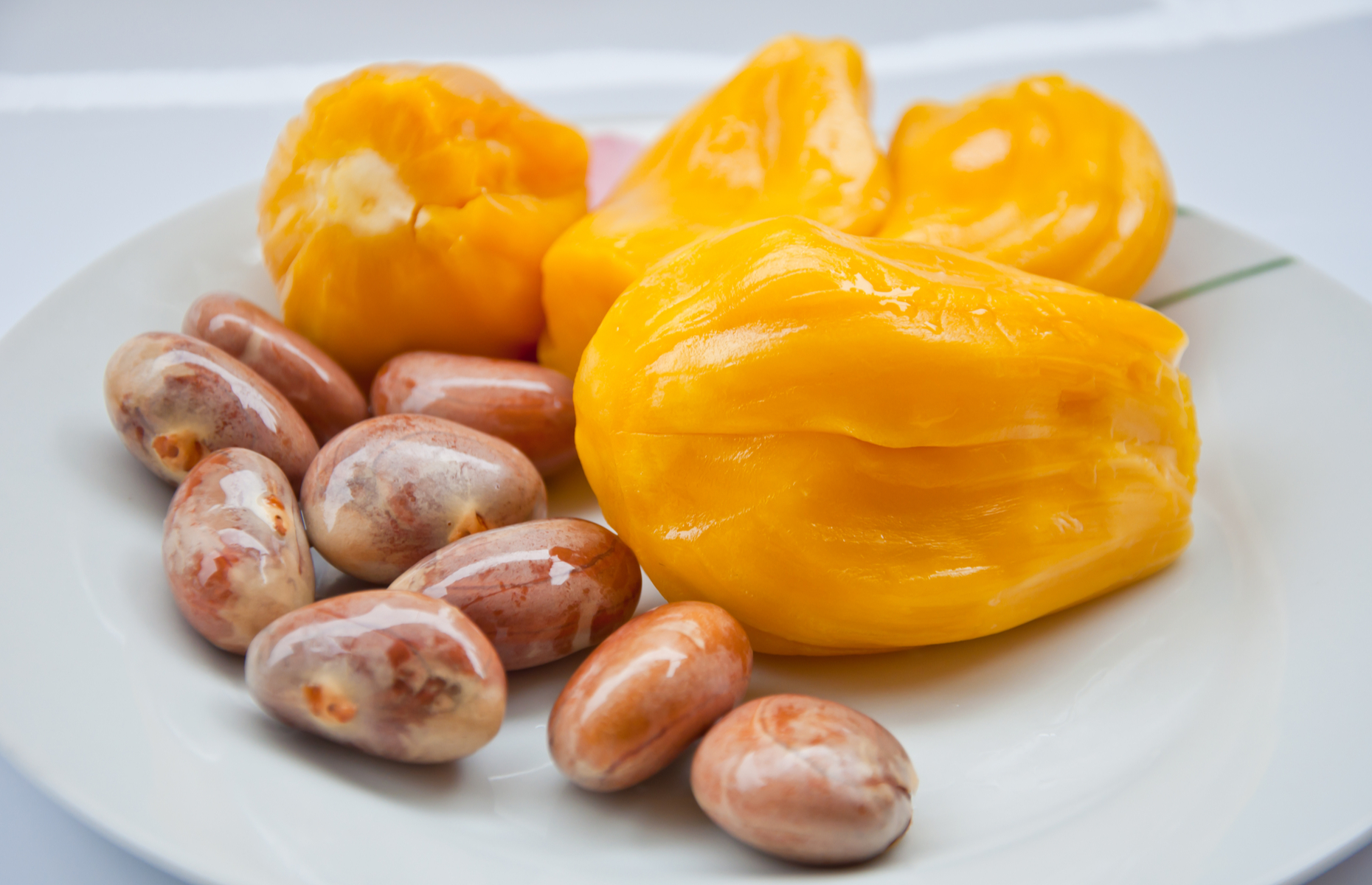Jackfruit seed milk powder lactose-free & gluten-free, with a low glycemic index – 100 g

For your purchase, we will credit you:
+69.25 Bodů do Bonusového programuDried milk of jackfruit seeds
Plant-based alternative with low glycaemic index
Discover Jackfruit Seed Vegetable Milk Powder - a unique plant-based milk alternative with a subtly nutty and naturally sweet taste. This nutritious superfood powder is ideal for vegans, diabetics and anyone looking for a healthier alternative to conventional grain products.
Made from the seeds of the jackfruit, one of the largest fruits in the world, prized not only for its sweet, meaty flesh but also for its nutritious seeds. Jackfruit is a traditional crop of tropical Asia, especially in India, Sri Lanka and Southeast Asia, where its seeds have been used for generations as a nutritious source of protein and energy.
In Sri Lanka, jackfruit is known as 'kos' and has historical significance - it served as a staple food during times of famine, providing long-lasting satiety and important nutrients. Today, its use is increasingly widespread, not only in traditional curries and soups, but also in modern vegetable products.
Processing jackfruit seeds is also environmentally friendly and sustainable - most people only consume the flesh, so the seeds often end up as waste. The production of this powder minimizes food waste and makes efficient use of the whole plant, contributing to a lower ecological burden and a sustainable food system.
This powdered milk is therefore not only rich in fibre, vegetable protein and minerals, but also refers to the long history of sustainable use of jackfruit. It is lactose and gluten free and has a low glycaemic index, which means it helps maintain stable blood sugar levels - an ideal choice for vegans, diabetics and anyone with a healthy and eco-friendly diet.
Want to harness the power of jackfruit seeds even more?
Try also Ceylon Kokonati jackfruit flour - a great gluten-free alternative for baking and cooking!
Want to prepare delicious vegetable tacos, curries or jerk "meat" without soy?
Try Ceylon Kokonati jackfruit in brine - easy to taste, great soaks up sauces and is perfect for quick and healthy meals!
Why choose jackfruit seed milk?
- Low glycaemic index - unlike cereal milks, it does not cause rapid blood sugar fluctuations.
- Lactose and gluten free - ideal for people with milk or gluten intolerance.
- Nutritionally rich - contains prebiotic fibre, antioxidants, magnesium, iron and essential amino acids.
- AIP diet - jackfruit is generally considered a suitable raw material for this protocol.
- Light and delicate taste - slightly nutty, with a natural sweetness without added sugars.
- Ethical and sustainable product - processes jackfruit seeds that would otherwise be waste.
The jackfruit used in this product comes from traditional (heirloom) seeds, which means it has not been genetically modified or patented by agrochemical corporations like Monsanto. These seeds are preserved by farmers for generations, allowing the plant to retain its original flavour, nutritional value and resilience without the need for synthetic pesticides and fertilisers.
How to use jackfruit seed milk powder
This herbal powder is very versatile:
- Preparation of vegetable milk - Mix 1-2 tablespoons of powder with 250 ml of water, mix or blend well. This reconstituted milk has a smooth creamy consistency and can be used just like regular milk.
- In smoothies and protein drinks - Add a spoonful for extra nutrients and a smoother texture.
- Thicken soups and sauces - Great as an alternative to cream in vegetable cooking.
- Baking Additive - Suitable for pancakes, cookies or muffins.
- Perfect for semolina porridge - Just mix it with water and thicken it like classic semolina.
Why include breadfruit seeds in the diet?
Jackfruit seeds are nutritious and rich in important substances that can contribute to overall health. Here is a list of benefits:
- Rich in minerals - they contain iron, potassium, magnesium, copper and calcium, which support blood circulation, proper muscle and nervous system function.
- Rich in fibre - they help support digestion and regulate digestion, which can help prevent constipation and promote healthy gut flora.
- They contain B vitamins - including B1 (thiamine), B3 (niacin) and B6 (pyridoxine), which are important for metabolism and energy expenditure.
- Natural source of vegetable protein - suitable for vegetarians and vegans as an alternative source of protein.
- Low glycemic index - they help maintain stable blood sugar levels, which is helpful for diabetics and people on a low-carbohydrate diet.
- They support a healthy electrolyte balance - thanks to potassium and magnesium, they can help with hydration and proper muscle and nerve function.
Recipe: vegetable jackfruit milk with vanilla flavour
This drink is ideal as a healthy alternative to classic sweet milks.
Raw materials:
- 250 ml of water
- 2 tablespoons jackfruit seed powder
- 1 teaspoon vanilla extract
- ½ teaspoon cinnamon
- Sweetener to taste (e.g. honey, coconut syrup, agave syrup, etc.)
Procedure:
- Mix the jackfruit powder with water and blend thoroughly to form a smooth milk.
- Add vanilla extract, cinnamon and any sweetener.
- Heat gently, but do not let it boil.
- Serve hot or cold as a delicious drink.
Jackfruit porridge - a healthier alternative to semolina porridge
Classic semolina porridge is made from white wheat flour, which:
- It is not certified organic - which means it may contain residues of pesticides, herbicides and other chemicals.
- It has a high glycaemic index - it rapidly raises blood sugar levels, leading to energy spikes.
- It contains less fibre and micronutrients - it is nutritionally poorer than natural alternatives.
On the contrary, jackfruit puree is:
- Nutritionally richer - naturally contains more fibre, vegetable protein and minerals.
- Gentle on digestion - it is gluten-free, so it does not burden the intestines.
- Low-glycaemic - does not cause sharp fluctuations in blood sugar.
Who is jackfruit seed powder ideal for?
- For diabetics and low-carb diets - thanks to its low glycemic index.
- For vegans and those who avoid dairy products - naturally lactose-free.
- For anyone who wants a healthier alternative to regular flour porridge.
- For those who care about ecology and sustainability - a product with minimal waste and sustainable sourcing.
Try jackfruit seed milk powder and discover a new, healthier way to plant-based nutrition!
The huge nutritional potential of breadfruit seeds - a study
Although breadfruit seeds have been shown to contain a number of beneficial nutrients or bioactive compounds that add real value to food, they remain under-utilised due to the limited commercial production of breadfruit.
They contain a wide range of nutrient-rich ingredients such as starch, fibre, phytonutrients, protein, minerals, lectins and also beneficial ingredients such as phenols and flavonoids.
This review focuses on important findings regarding starch extraction techniques and various conventional and new modification techniques and their effect on the functional properties of breadfruit seeds.
Breadfruit seeds are mainly rich in starch (70-85 %), which is used in food and other areas as a thickener, stabiliser, microencapsulant, coagulant, bioplastic, etc. and provides significant health benefits.
The usefulness of starch from breadfruit seeds is also well known. The processing of breadfruit seeds using various techniques to achieve versatile nutritional and functional components has a significant impact.
The creation of composite films, starch, food products, bioethanol, pigments and medical applications are key areas of ongoing study.
This article is based on an analysis of more than 150 scientific publications, including recent studies by various researchers, with the main focus on the properties of breadfruit seeds.
Read more on this topic
- Fruit flours I. - Breadfruit flour
- 9 Wonderful Benefits Of Jackfruit Seeds You Probably Didn't Know + A Killer Recipe
- Fruit flours II - Green banana flour
- Gluten-free diet not only for celiacs?
- Discover low carb or more energy, less sugar
- Vegetarian and vegan diet
- What to eat in winter to stay healthy?
- How to prevent Christmas overeating or mitigate its effects
- Enhance your workout with the right and effective supplements
What is a heirloom variety?
A so-called heirloom variety (whether of plants, seeds, fruits or vegetables) is an open-pollinated variety that was commonly cultivated in earlier times in human history, but is not used in modern large-scale agriculture because of the cartel-like behavior of a large corporation like Monsanto, which is behind the destruction of ancient seeds and the food chain in general across the planet.
See the document below. And here is a link to the website of a Canadian university, The University of British Columbia, which explains briefly what it is. If you do not speak English, use the online translator: deepl.com
We have translated this paragraph from the English Wikipedia:
Before the industrialisation of agriculture, a much wider variety of plant foods were grown for human consumption, mainly because farmers and gardeners saved seeds and cuttings for future planting. From the 16th century to the early 20th century, the diversity was enormous.
The old nursery catalogues were full of plums, peaches, pears and apples of many varieties and the seed catalogues offered legions of vegetable varieties. These catalogues were used to sell and trade valuable and carefully selected seeds along with useful advice on growing.
Since the Second World War, agriculture in the industrialised world has consisted mainly of food crops grown on large monoculture plots. Only a few varieties of each type of crop are grown to achieve the greatest consistency.
These varieties are often selected for their productivity and their ability to ripen at the same time and withstand mechanical harvesting and transport across borders, as well as their resistance to drought, frost or pesticides. This form of agriculture has led to a 75% decline in the genetic diversity of crops.
Although heirloom or heirloom cultivation has retained its place in local communities, it has seen a resurgence in recent years in response to the trend towards industrial agriculture. In the southern hemisphere, heirloom plants are still widely cultivated, for example in home gardens in South and Southeast Asia.
Before the Second World War, most of the products grown in the United States were heirloom varieties, but this was abandoned with the arrival of Monsanto.
Other sources of articles:
- The practice of Monsanto and BASF of Germany in pushing dicamba (a weed killer) on American farmers
- The Guardian:Revealed: Monsanto predicted cropping system will damage US farms
In the 21st century, many communities around the world are working to preserve historic varieties so that a wide range of fruits, vegetables, herbs and flowers are once again available to growers by restoring old orchards, sourcing historic fruit varieties, engaging in seed swaps and encouraging community participation.

Ceylon Kokonati uses only single origin, ethically harvested non GMO ingredients for their products. Their products are vegan, gluten-free, suitable for keto, paleo and raw diets. They do not contain any refined white sugar.
By buying them, you support traditional livelihoods and reduce your carbon footprint - because the products are produced and packaged right at the harvest site. Ceylon Kokonati strives for 100% zero waste production.
This product is internationally accredited by Control Union, certified organic (EU and USDA NOP), ISO and/or HACCP certified.
Ceylon Kokonati manufactures its products in a family-run sweatshop, pays fair prices to its suppliers and manufacturers, and incorporates generations of knowledge into its production processes. It uses only the highest quality ingredients.
So you can be sure that you are getting premium quality at a premium price. By purchasing products, you will be supporting the traditional livelihoods of villagers in the dry areas of Sri Lanka. This allows the villagers to benefit from their years of knowledge and expertise.
The sale of these products plays a vital role in employment and economic support for the village community. Ceylon Kokonati provides the children of its employees with school books and stationery for the entire school year.
What is single origin or "single origin"?
This claim means that the raw material comes from one geographical area(as opposed to raw materials taken from several countries around the world and then mixed together = a common practice for cheap products from so-called private labels).
None of Ceylon Kokonati's products is a so-called blend of several different ingredients from different parts of the world, bought at the cheapest prices. In English it is called'not blended'.
The fact that Ceylon Kokonati's ingredients/products are "single origin" from Sri Lanka only, means that the consumer's taste buds have a more consistent and higher quality experience, from batch to batch.
It is almost impossible to achieve an absolutely consistent taste without losing the natural flavour of the raw material. This is especially the case when the raw material for the production of a product is sourced from different places and of different quality.
In addition, you have no guarantee that it is really a pure and freshly produced product in organic quality.
Additional parameters
| Category: | Flour |
|---|---|
| EAN: | 4796010581009 |
| Suitable for: | Keto-Paleo-GMO Free-Vegan-Gluten Free Diet-LowCarb |
| Producer: | Ceylon Kokonati |
| Country of origin: | Sri Lanka |
| Why buy: | Single ingredient, packaged at source, never any additives, single-origin, GMO-free vegan. |
| Content: | 100 g |
Be the first who will post an article to this item!
The Ceilon Kokonati brand was established in 2013. In its range you can find a variety of high quality and affordable products made from sustainably produced coconuts, spices and tropical fruits.
The brand's name refers to the country that its founders consider home, Ceylon, Sri Lanka, where the coconuts for the coconut line of products are grown and processed. Ceylon, a British Crown Colony from 1815-1948, is now known as Sri Lanka, but the founders of the brand prefer to call it Ceylon because it definitely sounds more exotic and "pure Ceylon" is a brand in itself, reminiscent of the fresh unique essence of pure Ceylon tea. "Kokonati" on the other hand is Maori for coconut, so absolutely the most appropriate brand name for the most coconutty goodness ever.
The Ceilon Kokonati brand is run by a married couple. The female founding half is Mrs. Bûmika, which means Lady of the Earth in Sanskrit. Her great-grandfather was one of the pioneers of coconut oil pressing in Ceylon, making her the fourth generation of coconut oil presser. The male founding half, Mr. Mosqi, in turn, is originally a pure Ceylon tea grower.
Ceylon Kokonati is wholly owned and operated in New Zealand. Loose products from Kokonati uses several ethical brands that produce clean, organic food and beauty products. By selling Kokonati products, rural communities and traditional livelihoods are supported. All their products are ethically harvested and there is almost no waste in their production. Each part of the coconut is used in the production of a different product. Kokonati products are single-ingredient, packaged directly at the source, never mixed, single-species, non-GMO and vegan.
With a passion for organic, regenerative farming, sustainability and collective partnerships, Kokonati products come only from small farms and mills in rural villages in Sri Lanka. Each Kokonati product is produced in a specialized mill that produces only that type of product. Quality is therefore the best it can be, and every step of production is backed by the experience and knowledge of many generations. Ceylon is blessed with an abundance of healthy, exotic fruits, nuts, herbs and spices.
Ceylon Kokonati follows the principles of balanced living - live and let live.
They're trying to keep everything in even better condition than when they found it..

.jpg)









































































